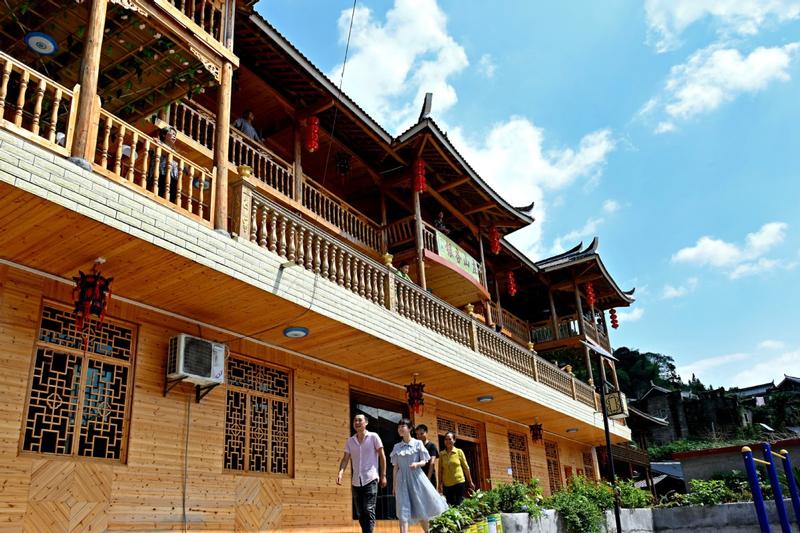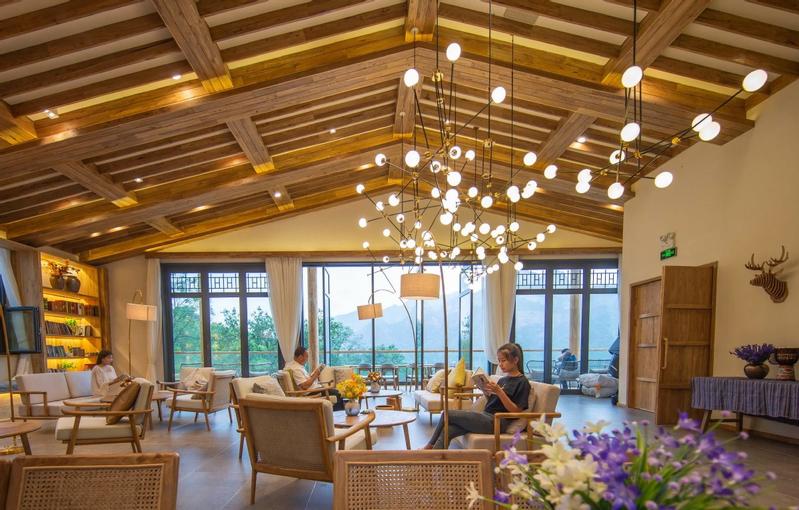 Visitors pass by a rural homestay in Shaoyang, Hunan province, in July. (TENG ZHIZHONG / FOR CHINA DAILY)
Visitors pass by a rural homestay in Shaoyang, Hunan province, in July. (TENG ZHIZHONG / FOR CHINA DAILY)
Last month, Zhang Yaqi, a 32-year-old English teacher in Shanghai, had what she described as "an unforgettable lodging experience". She booked a three-day vacation at a farmhouse in Moganshan, a leisure tourism and summer resort in Deqing county, Zhejiang province, through an online short-term homestay platform.
"Moganshan is an ideal tourist destination for people living in Shanghai and Hangzhou, Zhejiang province. There are lovely bamboo trees and tea gardens all around amid creeping vines in a serene environment," said Zhang, adding that her family members had a rare chance to get away from the hustle and bustle of the city and embrace nature.
The accommodation cost Zhang's family 410 yuan (US$59) per night."The host also prepared breakfast for us. I was thrilled by my decision to try out the homestay concept and felt very comfortable staying there. I will recommend homestay holidays to my friends," she said.
During the first five months of the year, transaction volume of the shared accommodation market fell by 72.1 percent on a yearly basis due to the pandemic
As the COVID-19 outbreak increasingly comes under better control in China, the country's short-term vacation rental industry is also gradually recovering, with rural homestays and short-distance travel gaining popularity among Chinese tourists.
According to a report from the Sharing Economy Research Center under the State Information Center, revenue from China's shared accommodation sector increased month-on-month by 78 percent, 199 percent and 35 percent, respectively, from March to May, while order numbers rose by 141 percent, 152 percent and 50 percent over the same period.
During the first five months of the year, transaction volume of the shared accommodation market fell by 72.1 percent on a yearly basis due to the pandemic, with the number of bookings dropping 65 percent compared with the same period last year.
The report also said revenue of the country's homestay services industry reached 22.5 billion yuan in 2019, an increase of 36.4 percent year-on-year.
The China branch of US-based Airbnb said rural homestays are popular choices for leisure travel, given the need for physical distancing in the wake of the pandemic.
Bookings of rural homestays were mainly for kezhan (small-scale Chinese-style homestays), farm stays, cottages and villas, all of which have witnessed robust growth as the outbreak comes under better control.
"Pent-up travel demand is being unleashed rationally. In the short term, short-haul trips will become the norm, while rural tours are becoming increasingly popular choices. Cleanliness and hygiene of accommodations will also be a top priority for Chinese tourists," said Peng Tao, president of Airbnb China.
 Customers read at a bed-and-breakfast homestay in Wuan, Hebei province, in July. (PHOTO / XINHUA)
Customers read at a bed-and-breakfast homestay in Wuan, Hebei province, in July. (PHOTO / XINHUA)
"Travel is one of the most resilient industries in the world," Peng said. He is bullish on the travel and tourism prospects and the short-term rental sector, saying demand for weekly and monthly rentals has surged during the pandemic.
"Based on our latest survey, nearly 60 percent of hosts said they were willing to accept more weekly and monthly rentals to alleviate operational pressure," he added.
The Ministry of Culture and Tourism announced in July that travel agencies and online tourism companies were gradually allowed to resume their trans-provincial group tours. The resumption has unleashed domestic travel demand of those who had canceled their reservations and stayed indoors under self-quarantine orders.
ALSO READ: Homestay operators under tremendous pressure
A survey conducted by consultancy Kantar showed that 81 percent of interviewees preferred "traveling closer to home". In the next 12 months, 73 percent of those surveyed prefer "traveling by car", higher than the proportion preferring air travel (66 percent) and train travel (57 percent).
It also showed that "beach and shore", "suburban town" and "countryside" are the top choices of a first trip after travel restrictions were eased. Travelers are expecting to "have immersive experiences that show them something new", not just "visiting popular tourist sites or destinations".
Airbnb has established partnerships with local authorities and industry associations in Zhejiang province and Guilin, the Guangxi Zhuang autonomous region, to bolster the recovery of the tourism industry and drive local rural revitalization.
Han Mengying, an analyst from market consultancy Analysys, said that compared with hotels, the recovery of the vacation rental market is slower due to its nonstandardized management methods and community-based services.
Data from Chinese homestay listings provider Xiaozhu also showed the recovery of rural homestays is much faster than short-term urban rentals.
Orders from Xiaozhu's official online store in Fliggy, Alibaba's travel service platform, surged by 600 percent in the second quarter compared with the first quarter. Visitors splurged to see natural scenery, experience traditional villages and soak in local customs and culture to get away from the pressures of urban life.
Xiaozhu provided long-term rental options for shared accommodation providers on its platform when the pandemic erupted to mitigate the negative effects on the home-sharing industry.
Wang Liantao, co-founder of Xiaozhu, said the company is ramping up efforts to develop rural tourism and explore the rural homestay market. For instance, Xiaozhu now has more than 3,000 rural listings located near Chengdu, Sichuan province, tripling the 2017 figure.
Moreover, the quality of rural homestays is improving as some operators are learning to add more dining and entertainment items, such as offering local cuisine or designing themes such as meditation, hiking and yoga.
"Demand for rural homestays can't be ignored. We can see more and more people from major cities preferring to take vacations on weekends. On the policy level, rural homestays are consistent with the country's rural revitalization strategy and people are willing to invest more resources in the lucrative sector," Wang said.
Xiaozhu also launched livestreaming sessions to promote short-term rentals of shared homes and introduce local specialties in Zhejiang, Yunnan, Sichuan and Guizhou provinces by teaming up with Fliggy and Taobao.
Statistics from Tujia, an online platform akin to Airbnb, showed bookings for rural homestays accounted for 48 percent during the Labor Day holiday, up 6 percentage points on a yearly basis, while urban homestays took up 52 percent.
According to Tujia, Deqing county, Huzhou, Zhejiang; Pixian county, Chengdu, Sichuan; and Chun'an county under Hangzhou in Zhejiang, were highly favored by tourists.
"Demand for short-term leisure tourism is on the rise as more and more people prefer to get close to nature and stay away from the hustle and bustle of cities," said Lai Zhen, an analyst at iResearch.
READ MORE: No place like homestay as rustic approach pays off
Lai said short-term home rentals and homestay services are now wide ranging to satisfy the needs of various kinds of tourists. Typically, customers hire such services for get-togethers, reunions, team-building activities and to improve parent-child bonding and communication.
Cooperation between the government and enterprises to build tourism projects in rural areas will create more job opportunities for villagers. At the same time, the projects will alleviate poverty to some extent, Lai said.


